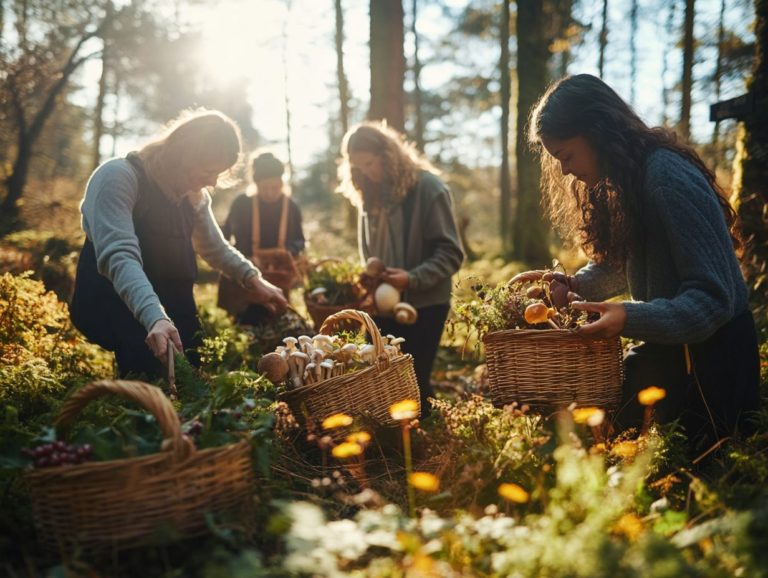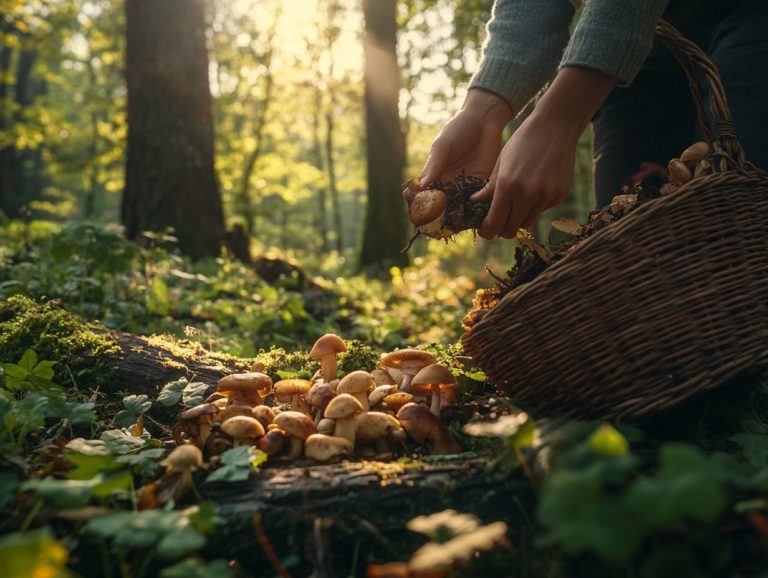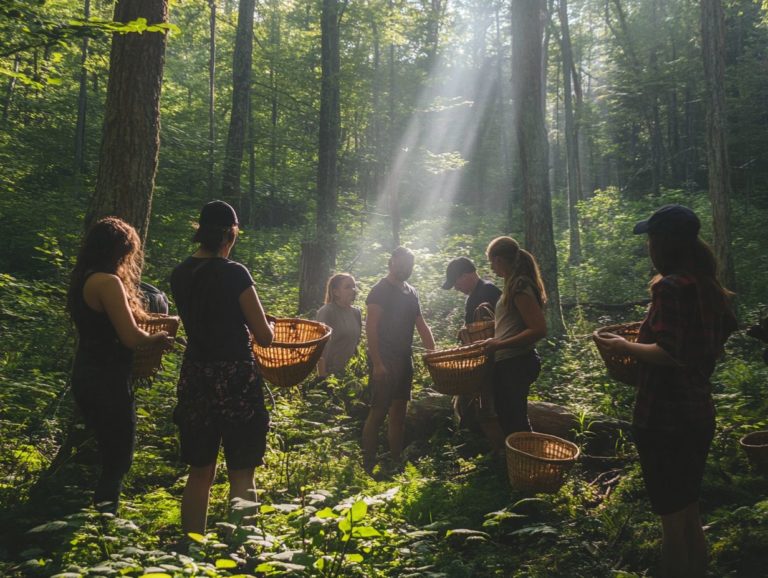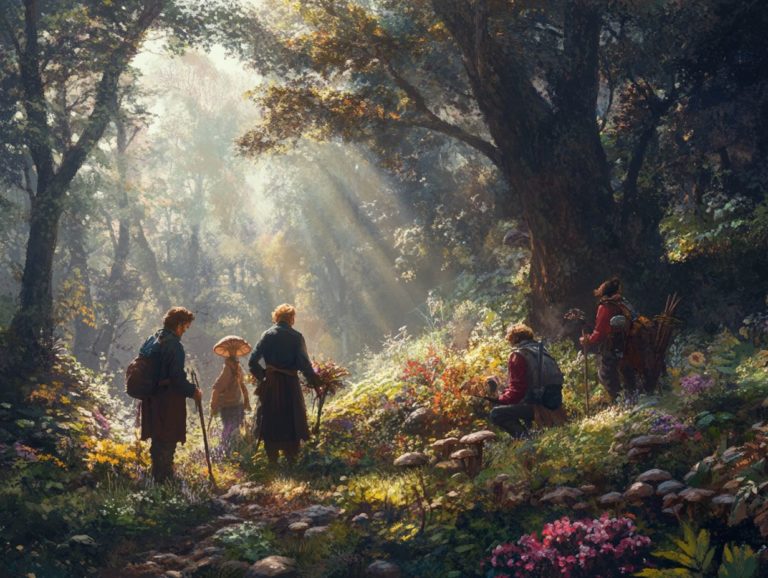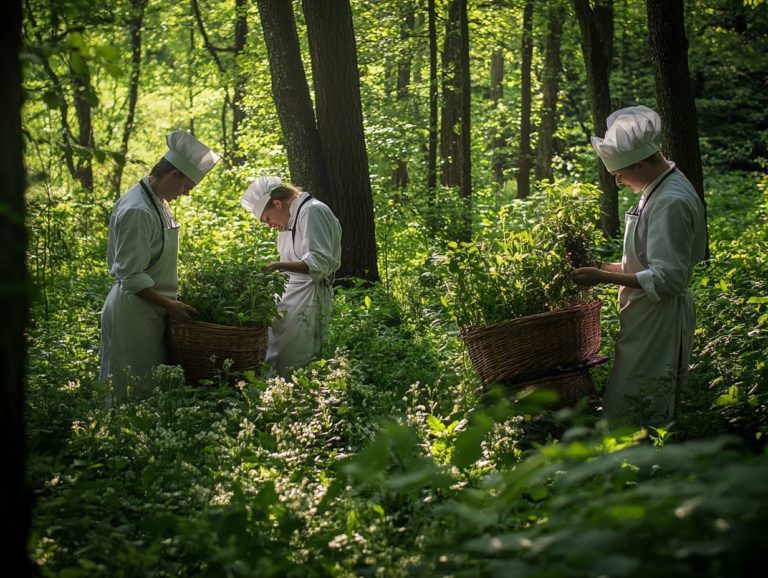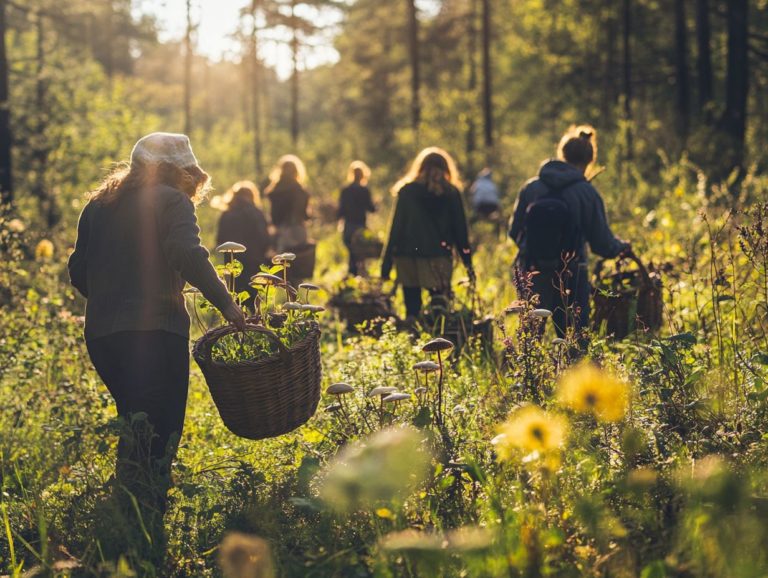Connecting with Other Foragers: Best Practices
Foraging communities encompass much more than mere gatherings of individuals collecting wild edibles; they represent vibrant networks where knowledge, resources, and experiences flow freely.
Connecting with fellow foragers brings a wealth of benefits, elevating your knowledge and skills in identifying edible plants and mushrooms, ultimately enriching your foraging experience.
Whether you re considering joining an online group or seeking in-person connections, you ll find best practices for building respectful and collaborative relationships.
Immerse yourself in this exploration to uncover how these connections can enrich your foraging journey!
Contents
- Key Takeaways:
- Benefits of Connecting with Other Foragers
- How to Find and Join Foraging Communities
- Best Practices for Interacting with Other Foragers
- Building and Maintaining Relationships within Foraging Communities
- Frequently Asked Questions
- What are some best practices for connecting with other foragers?
- Why is it important to connect with other foragers?
- How can I find other foragers to connect with?
- What should I keep in mind when connecting with other foragers?
- Are there any online resources for connecting with other foragers?
- Can I connect with other foragers in person during the COVID-19 pandemic?
Key Takeaways:
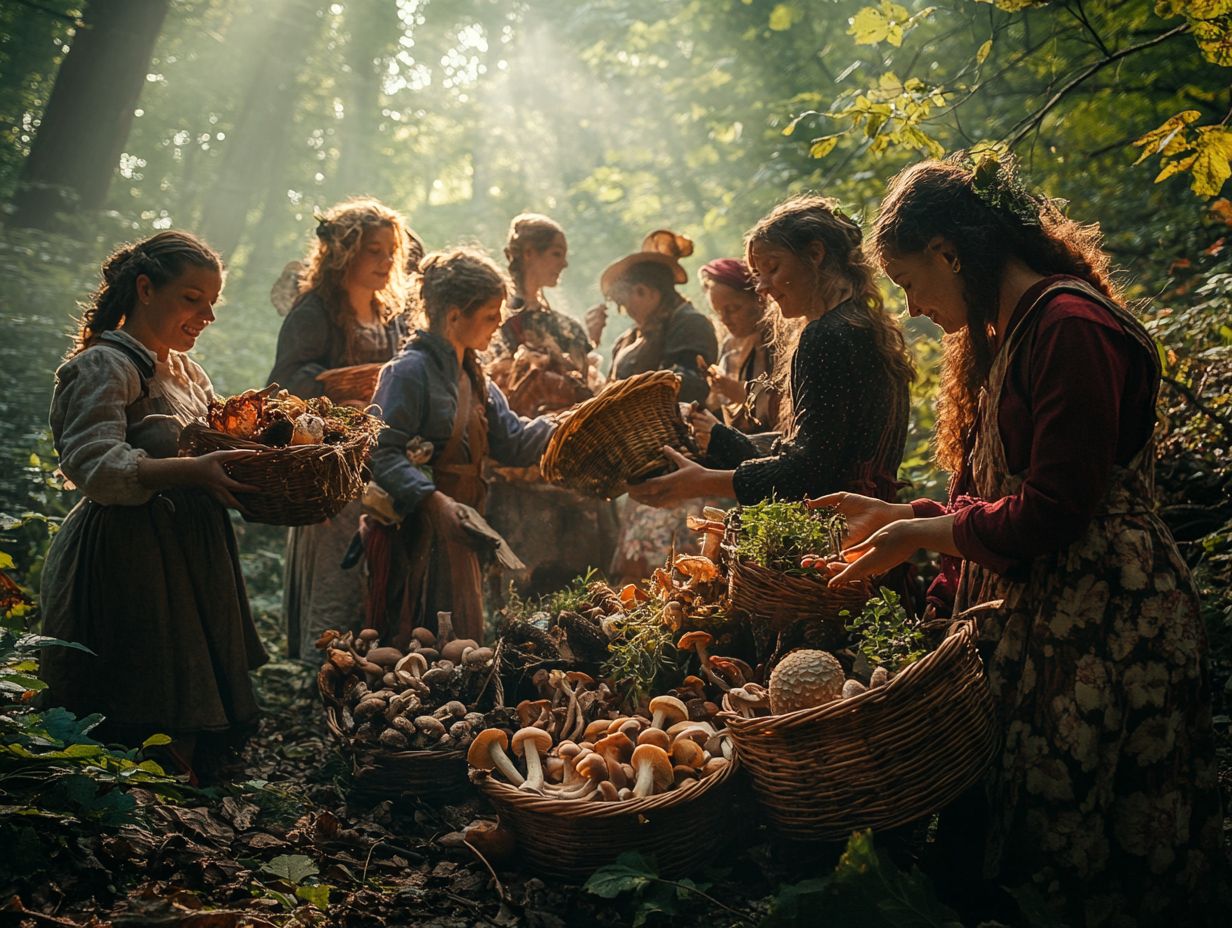
- Connect with other foragers to share knowledge and resources, and build a support system in the foraging community.
- Find and join foraging communities both online and in-person to expand your network and learn from others.
- Practice respect, collaboration, and communication within foraging communities to build and maintain strong relationships.
What are Foraging Communities?
Foraging communities are vibrant networks of individuals who share your passion for exploring nature and identifying wild foods, from mushrooms to plants. These groups foster connections among like-minded enthusiasts, facilitating the exchange of knowledge and resources, including how to use social media for foraging tips that are essential for sustainable harvesting and ethical foraging practices.
You ll find members gathering for classes and workshops, honing their skills in identifying various species and diving into the intricacies of local flora.
Through this networking, you can build a support system that promotes education and nurtures a profound love for the environment and the thrill of discovering new species.
The role of community groups in this journey is important, providing a platform for shared experiences and diverse teaching methods that enrich your learning.
By identifying species together, you cultivate a deeper understanding of your local environment, which is crucial for sustainable practices.
These interactions often lead to informal mentorships, where seasoned foragers can pass down their techniques to newcomers like you. To enhance these experiences, it’s crucial to understand how to promote foraging safety in groups. As a result, the community not only gives you the power in your foraging skills but also fosters a collective responsibility for preserving the ecosystems you cherish.
Ultimately, these communal efforts enhance your appreciation of nature, forging lasting bonds and instilling a sense of stewardship for future generations.
Benefits of Connecting with Other Foragers
Connecting with fellow foragers brings a wealth of benefits, enhancing your knowledge and skills in identifying edible plants and mushrooms. Learning how to forage responsibly ultimately enriches your foraging experience.
This interaction creates valuable opportunities for shared learning. You ll exchange tips, uncover new species, and refine sustainable harvesting methods.
As you gather with others, you cultivate a sense of belonging and community, essential not just for personal growth but also for fostering environmental stewardship.
Sharing Knowledge and Resources
Sharing knowledge and resources within foraging communities is essential for refining your skills and enhancing your ability to identify edible plants and mushrooms.
By engaging in discussions and inviting fellow enthusiasts to share their insights, you contribute to a dynamic network centered on sustainable practices.
Organized workshops provide a valuable opportunity for you to learn from others expertise on local flora while also witnessing practical foraging techniques that elevate your learning experience.
Online classes and forums serve as excellent platforms for exchanging experiences and recommending insightful books and resources.
This collaborative approach deepens your understanding of the ecological significance of the plants you gather and highlights the importance of preserving native species for future generations.
Join a local foraging group today and start your adventure into nature s bounty!
Building a Support System
Join a vibrant foraging community and gain the support you need for an exciting adventure! A support system within foraging communities gives you the power to rely on others for guidance, safety, and encouragement during your foraging adventures.
This network enhances your practical skills and fosters a deeper sense of belonging. As you and fellow members share experiences and knowledge, your journeys become enriched. In unfamiliar public spots, having a supportive community ensures you can navigate safely and receive guidance on the proper identification of plants and mushrooms. This significantly reduces the risks associated with misidentification.
The true power of community lies in its ability to boost your confidence. As you learn together and celebrate discoveries, you become more adept at foraging. Sharing stories of both successes and challenges strengthens relationships, making your foraging experience all the more fulfilling and enjoyable.
How to Find and Join Foraging Communities
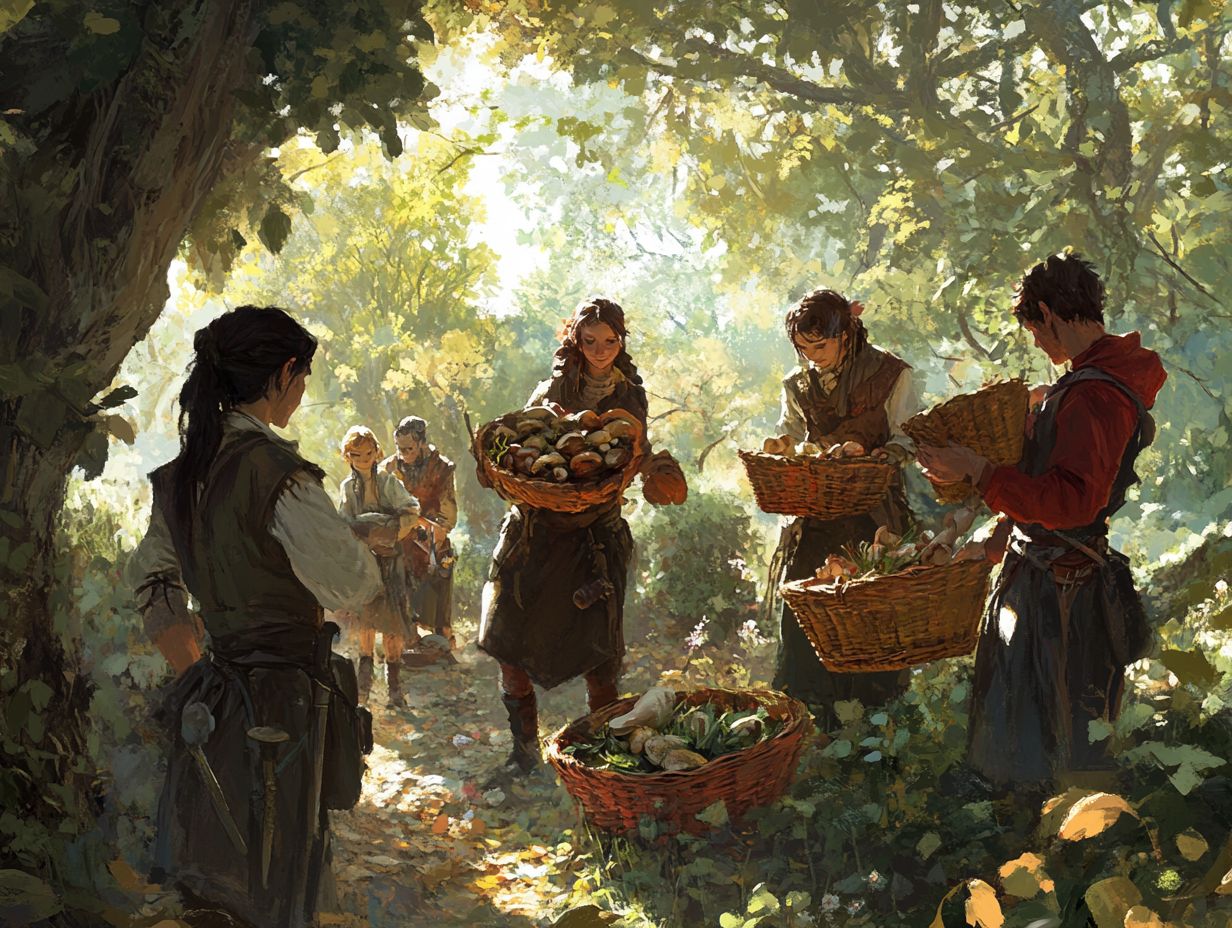
Don’t wait! Dive into resources available on social media and local clubs to connect with fellow foragers today! Discovering and joining foraging communities can significantly enrich your foraging experience, opening doors to invaluable learning opportunities and connections with fellow enthusiasts who share your passion for wild foods.
You’ll find an abundance of resources at your fingertips social media platforms like Facebook, local mushroom clubs, and community groups that offer classes and workshops tailored to your interests. (Mycology is the study of fungi.)
Whether you prefer urban foraging meet-ups or immersive wilderness expeditions, there are plenty of options available to match your interests and experience level.
Online and In-Person Options
You ll find a plethora of online and in-person options for joining foraging communities. Each one offers unique benefits that can enhance your understanding of wild foods.
By tapping into online platforms like forums and social media, you can connect with fellow foraging enthusiasts. Exchange invaluable tips and unearth local treasures in the wild. Websites dedicated to foraging serve as a treasure trove of information, guiding you through the identification of edible plants and sustainable harvesting practices.
On the other hand, participating in local classes, workshops, and community events doesn t just provide you with hands-on experience; it also opens the door to invaluable networking opportunities. These in-person interactions can lead to mentorships and friendships, enriching your foraging journey and deepening your appreciation for nature s abundant offerings.
Best Practices for Interacting with Other Foragers
Understanding best practices for engaging with fellow foragers is crucial for fostering a respectful and thriving community atmosphere, especially regarding ethics and collaboration. Learning how to use technology for foraging connections can enhance your experience. Follow guidelines for sustainable harvesting techniques and responsible knowledge sharing to help create a positive environment that supports both personal development and environmental conservation.
Your commitment to these principles not only enriches your experience but also strengthens the community as a whole.
Respecting Boundaries and Ethics
Respecting boundaries and ethics within foraging communities is essential for fostering healthy relationships among members. This ensures the sustainability of wild food resources.
This shared responsibility strengthens your community bonds and nurtures a culture of environmental stewardship. Adhering to structured guidelines for sustainable harvesting taking only what you need while ensuring nature can replenish is crucial. For example, you should only take what you need, leaving enough for wildlife and future generations.
Equally important is your awareness of local laws regarding private property. Engaging with landowners to seek permission can lead to mutually beneficial experiences that enrich your foraging endeavors.
Sharing tips from identifying edible species to utilizing the right tools can significantly enhance your foraging journey. For those interested in forming their own networks, tips for starting your own foraging group can be invaluable. Community experiences often reveal the joy of discovery and learning, reinforcing the idea that ethical foraging transcends mere practice; it’s about creating a supportive network that deeply values conservation.
Collaborating and Learning Together
Collaborating and learning together lies at the heart of foraging communities. This enriches both your individual knowledge and the collective wisdom through shared experiences and resources.
Workshops provide a fantastic opportunity for you to explore the intricacies of local flora. Skilled foragers impart their expertise on identification techniques, safe harvesting methods, and cooking tips. These engaging sessions not only deepen your appreciation for nature but also help you forge friendships with fellow participants.
Group foraging outings foster camaraderie as you embark on adventures together, sharing tips and stories in real-time.
Successful community initiatives, like neighborhood harvest festivals, showcase how your joint efforts can lead to innovative recipes and preservation techniques. These experiences reinforce the importance of collective learning and collaboration in sustainable living.
Building and Maintaining Relationships within Foraging Communities
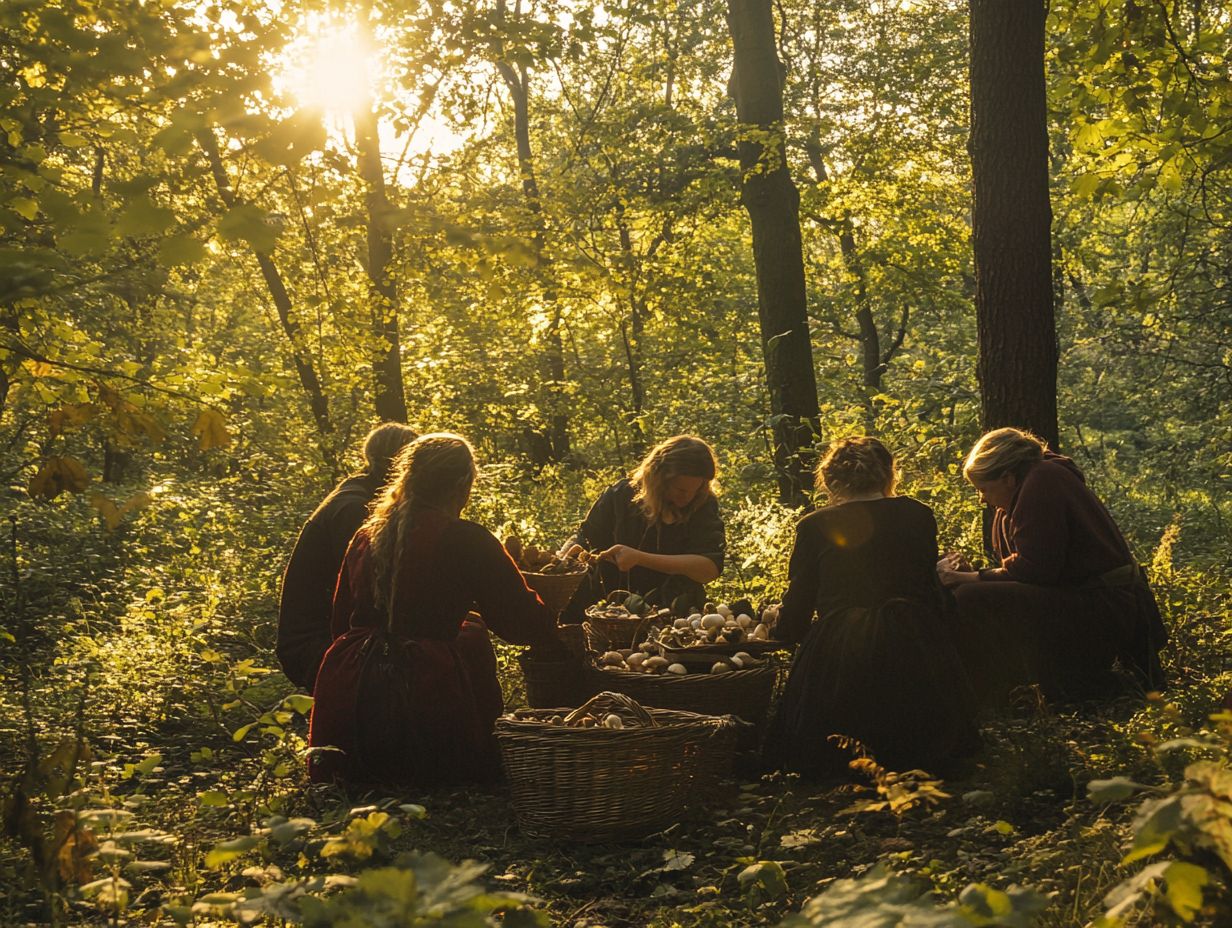
Building and nurturing relationships within foraging communities is crucial for cultivating a supportive and enriching environment. In this space, members can truly thrive and share their passion for nature and wild foods.
Communication and Conflict Resolution
Effective communication and conflict resolution are essential for fostering vibrant foraging communities. These practices ensure that ethical practices and mutual respect thrive among all members.
To facilitate open communication, it s essential to employ strategies like active listening. Engaging with others’ perspectives and using techniques such as mediation can help address disputes effectively. By nurturing an environment where everyone feels safe to express their thoughts and feelings, you can help group dynamics flourish.
Regular check-ins and community meetings provide excellent platforms for dialogue. They reinforce the shared values and ethics that unite everyone. These practices empower you and others to tackle conflicts constructively and cultivate a strong sense of belonging, making it easier to navigate challenges and celebrate successes together.
Continuing to Learn and Grow Together
Continuing to learn and grow together is central to foraging communities. Here, you actively seek to expand your understanding of wild foods and sustainable practices.
This journey presents a wealth of ongoing educational opportunities, including engaging classes and hands-on workshops. These not only deliver essential information but also cultivate a spirit of collaboration. Dive into the rich diversity of your local environment through organized outings, where you ll learn from seasoned foragers and exchange valuable insights.
Incorporating various resources such as informative books and comprehensive online materials greatly enhances your collective learning experience. Utilizing these tools helps you stay informed about the latest foraging methods and sustainability practices, contributing to a vibrant, knowledgeable community.
Frequently Asked Questions
What are some best practices for connecting with other foragers?
Some best practices for connecting with other foragers include actively seeking out communities or groups dedicated to foraging, being open to learning and sharing knowledge, and following guidelines on how to build a foraging community, while also respecting the environment and fellow foragers.
Why is it important to connect with other foragers?
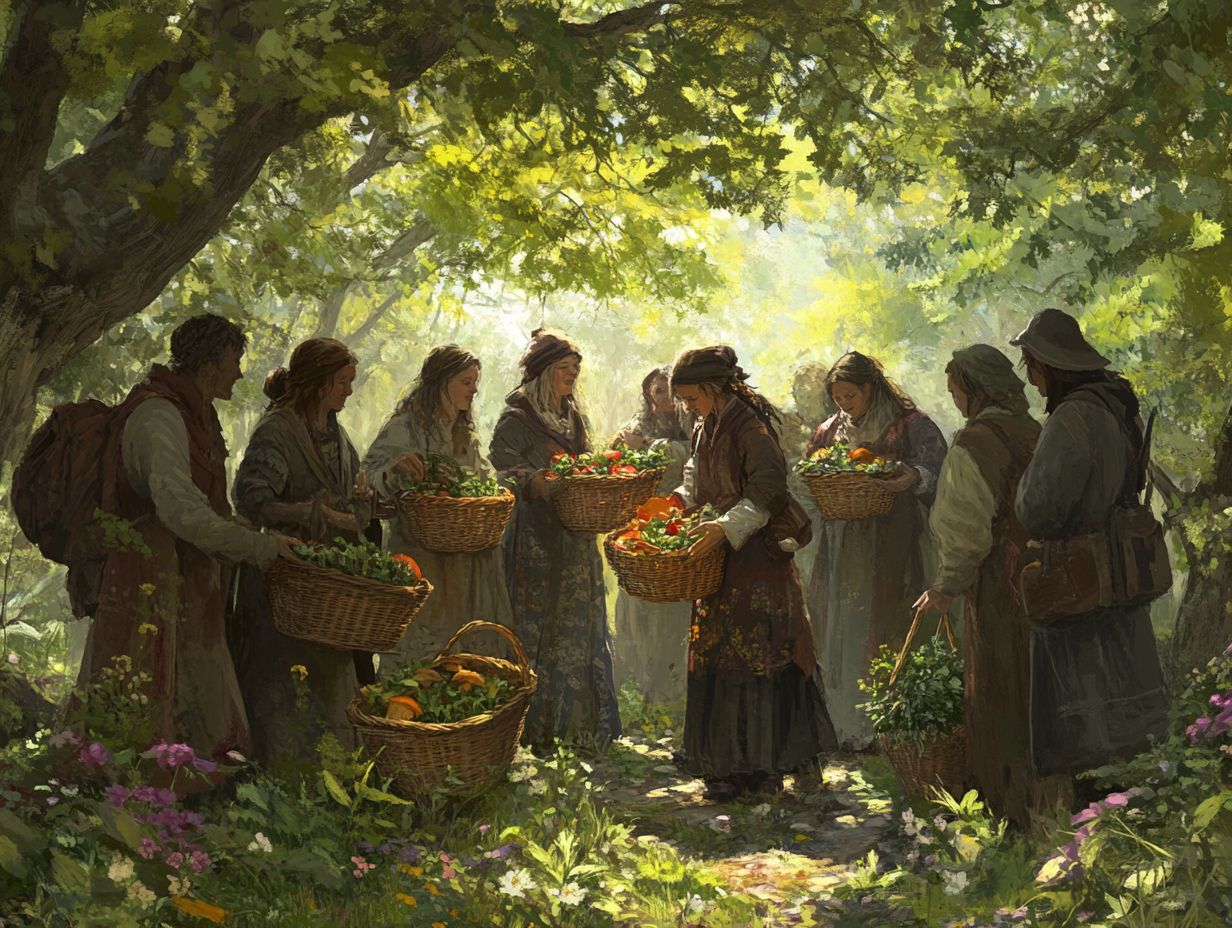
Connecting with other foragers provides a sense of community and support. It expands your foraging knowledge and skills while incorporating foraging techniques that promote community and sustainable practices.
How can I find other foragers to connect with?
Join a vibrant community of foragers today! You can find other foragers through online forums, social media groups, local foraging events, or by striking up a conversation with fellow foragers in the field. Additionally, learn how to share foraging knowledge with others to enhance your experience.
In conclusion, engaging with foraging communities not only enhances your skills but also fosters meaningful relationships and sustainable practices. To navigate these communities effectively, it’s important to understand foraging etiquette. Embrace the opportunity to learn, grow, and connect with others who share your passion for nature and wild foods.
What should I keep in mind when connecting with other foragers?
When connecting with other foragers, always ask for permission before foraging on someone else’s land.
Respect the area’s rules and share honest information.
Are there any online resources for connecting with other foragers?
Yes! Many online resources can help you connect with fellow foragers.
Check out great examples like foraging.com, Reddit’s r/foraging community, and the Facebook group “Foraging, The Art of Wildcrafting.”
Can I connect with other foragers in person during the COVID-19 pandemic?
In-person foraging events may be limited right now.
However, you can still connect with others virtually through online communities, webinars, or virtual foraging events.

